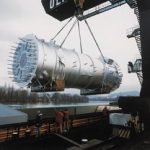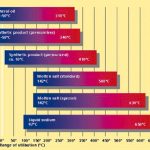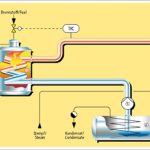The key advantage of indirect heat transfer is that a product can be heated uniformly, without localised overheating, to the desired process temperature at a separate location from the heat generator. This is beneficial both for the process and for production methods, and in many cases offers increased operating safety.
The Swiss company Bertrams designs and builds systems using organic thermal oils or synthetic thermal fluids that can operate at temperatures up to 410°C. For temperatures up to 500°C standard molten salts are used. These are eutectic mixtures which melt at 142°C (when new), to give a low-viscosity fluid under plant operating conditions. Special molten salts are used for higher temperatures up to 630°C. The heat transfer salts normally used for the above high temperatures are circulated through the system with no pressurising gas above the liquid level. This is in contrast to systems in which the heat transfer medium is water or an organic or synthetic liquid. To prevent evaporation of these media, systems of this type must be pressurised even at relatively low temperatures, therefore involving higher investment and operating costs in most cases. Heat transfer systems using molten salts are provided with a tank from which the salts are continuously pumped through the heat generator and heat user. The tank also serves to collect the molten salts, which drain into it when operation is interrupted, thus preventing solidification of the salts in the system (“frozen pipes“).
The heat transfer media are heated to the desired temperature at high efficiencies (for example up to 93% in heaters with gas firing). Various fuels are available, depending on local conditions for the particular application: gases or liquid fuels as well as solids or wastes, and multiple-fuel options also exist. Standard burners or special burners designed for low NOx emissions (100mg/Nm3) are used.
The well-proven heater design centres on a tube coil which is free to expand and is often constructed with impressive dimensions. Heights of up to 16m and diameters of 5.5m are repeatedly called for. The effective length of the tubing in heaters of this size is over 6.5km, which – depending on the tube diameter – can mean a heat transfer surface of over 1500 m2. Heat transfer systems to this design can have capacities anywhere between 50kW and some 35MW, thereby satisfying a wide variety of requirements on the part of heat users. By combining several heaters in a battery, it has been possible to build systems with capacities exceeding 100MW.
Wide range of system options
Apart from heat transfer systems based on oil and molten salt heaters, chemical plants and refineries also make use of process gas heaters and waste heat recuperators. In the former, the process liquid or gas being fed to a chemical process passes through a fired heater with no intermediate fluid. The latter takes advantage of a suitable existing source of heat to raise the temperature of thermal fluids.
Electrically heated systems offer an effective heating method for smaller capacities or for use in potentially explosive atmospheres.
As a rule, large-scale heat generation plants also include, in addition to the heater itself, a burner unit with its fuel supply line, an air preheater, combustion air fans and an integrated instrumentation and control system. Professional consultancy services, project engineering, manufacturing, erection and commissioning – all underpinned by a wealth of experience worldwide – are key factors in the success of turnkey thermal engineering systems of this type.
Case study: plant revamp in just a few days
The German firm Aluminium Oxid Stade (AOS) is owned jointly by VAW and Reynolds, and is located at Stade near Hamburg. Heat generation is a key utility at AOS, which processes imported bauxite to pro-duce aluminium oxide and hydroxide for its parent companies. For decades AOS has used process heaters manufactured by Bertrams. Four units are erected in a battery, each one having a heating capacity of 23 MW with a natural gas burner. Molten salts at a working temperature of 400°C are used as thermal fluid, with the advantage of optimum heat transfer properties and non-pressurised operation. The energy from the heaters is used in the continuous bauxite digestion process, one of the steps necessary for the manufacture of aluminium oxide.
After more than 25 years in operation, the central thermal fluid system in the AOS works recently underwent a revamp, the plant capacity also being increased at the same time. One of the four heater units in this plant was upgraded in only six days during a scheduled production shutdown. In addition to other work, key components of the heater, such as the tube coils, shell, etc., were replaced by newly manufactured parts. While this was going on, of course, the other three heater systems continued to operate at full capacity to keep the production process going.
Only by resorting to three shifts, with all those involved working to a detailed micro-management schedule, was it possible to complete the work in Stade within the limited time available. All the activities necessitated by the peripherals and infrastructure of the heat generation plant also had to be carefully dovetailed. While preparations were being made to revamp the AOS heating system, it became apparent that the heater shells which were to be supplied could not be transported by road in one piece on account of their size. They were therefore dismantled into three pieces and welded together on site. Finally, the utmost skill was demanded of the erection team that connected up the 20 parallel passes of the heater tube coil. In the near future the other three AOS heater units will also be revamped one by one.
Bertrams
Fax: ++41/61/4 67 52 25
Further information cpp-261
Unsere Webinar-Empfehlung
Der Webcast MTP und modulare Produktion bietet eine einzigartige Gelegenheit, mehr über die aktuellen Entwicklungen bei MTP und in der modularen Produktion zu erfahren.
Chemie- und Pharmaproduktion braucht mehr Flexibilität
In der heutigen sich schnell wandelnden Welt stehen…
Teilen:














